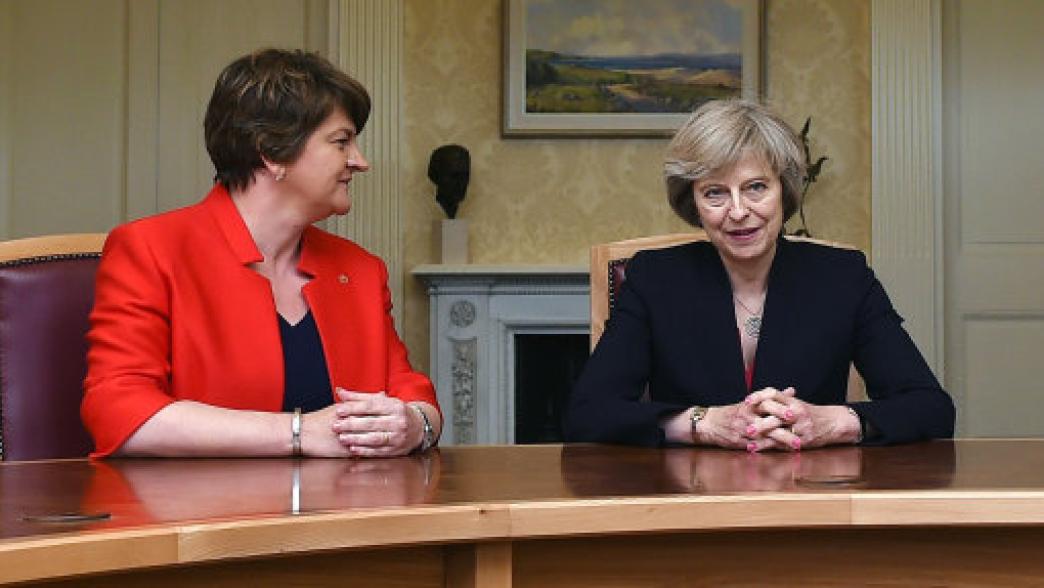
Minority government can work surprisingly effectively, argues Akash Paun, but the Government will need to change its approach if it is to pass the necessary Brexit legislation through Parliament before the clock runs out.
Nearly two weeks after the general election, we have the strange spectacle of a government commencing Brexit talks and setting out its legislative programme without it being wholly certain that the Prime Minister can form a functioning government at all.
The assumption is that a deal of some kind between the Conservatives and the Democratic Unionist Party (DUP) will shortly be concluded, principally because there is no other option. Even if Labour could persuade all the other centre-left parties to work together, they would have fewer MPs than the Conservatives alone.
What might a Conservative-DUP deal look like?
The key question is therefore what kind of understanding the Conservatives and DUP will reach. Barring another major surprise, there will be no full coalition involving DUP ministers around the Cabinet table. This is surely helpful for the sake of the stalled negotiations on resuming power-sharing in Belfast, for which the British government has to play the role of honest broker.
Instead, a ‘confidence and supply’ deal is expected. This would see the DUP back the Government on life-and-death votes: confidence motions, the supply of finance to government, and probably votes on the Queen’s Speech and Budgets. It might also include a commitment to support Brexit legislation, although the DUP will surely avoid offering the Government a blank cheque.
In return, the DUP will be seeking a set of concessions, mostly with a price tag attached. Additional funding for devolved government in Northern Ireland is expected. This could come in the form of a straight addition to the block grant for devolved public services, although that would look crudely transactional and would annoy the other devolved governments as well as many in England.
Instead, more subtle ways to channel additional money across the Irish Sea might be sought. For instance, a commitment that corporation tax can be cut to the lower level in the Republic, but with the Treasury rather than the devolved budget picking up the tab. The DUP may also seek additional guarantees around lost EU spending programmes, extra infrastructure investment as part of the UK industrial strategy, and a reversal of planned welfare cuts.
As for Brexit, the DUP was pro-Leave during the referendum, but is concerned about the impact on cross-border economic activity should the UK leave the Single Market and Customs Union. So while an obvious solution to the Irish Border issue has yet to be found, the DUP may at least ensure it is kept high up on the Westminster agenda and challenge the loose rhetoric of no deal being better than a bad deal.
Governance and procedural issues are also important to making a success of cross-party cooperation. The DUP would be well-advised to secure ongoing consultation rights as policy is developed, in particular before future fiscal events and as Brexit negotiations progress. The party could also request the chair of a select committee with a UK-wide remit such as defence.
How long will a minority government last?
If the Government, with or without DUP support, passes its first test next week when MPs vote on the Queen’s Speech, it might then be secure in office for a while at least. Minority governments can survive a surprisingly long time, even if they lose a lot of votes along the way. The Wilson and Callaghan administrations from 1974 to 1979 lost around 60 Commons votes, including on major legislation. It was only defeat on a confidence motion that brought the curtain down.
But a government in normal circumstances has a legislative programme comprising a set of largely unconnected bills. If a minority administration loses its NHS reform bill, for instance, this usually will have no impact on its education or criminal justice legislation.
Brexit changes this context. Leaving the EU will require passage not only of the centrepiece Great Repeal Bill but also an estimated 10-15 other bills to create new policy frameworks in areas currently governed by EU law, such as trade, immigration and agriculture. With limited time and little room for manoeuvre, these bills will need to be prioritised and carefully managed.
These bills will also need to work as a package, both to reflect the deal struck with the EU and to maintain what is likely to be a fragile domestic consensus. If important parts of the legislative programme are lost, the deal could start to unravel.
The other problem minority governments face is losing control of the legislative timetable. Opposition MPs and backbenchers are often more willing to vote against ‘programme motions’, curtailing time for debate, than they are to oppose the substance of government policy. The Lords also has the ability to hold legislation up.
This could become a serious problem given that the Article 50 clock will be ticking loudly in the background: as things stand, everything must be agreed and ratified by March 2019. A leadership challenge or another election would delay things further, raising the risks of the UK falling over the cliff edge of Brexit without agreed terms.
To navigate this minefield, the Prime Minister must not only keep the DUP onside but also balance the pressures of competing factions within the Conservative Party. Without a working majority, the Government will need to change its style accordingly. This will require the Government to allow the opposition and the devolved governments meaningful influence over the terms of Brexit. Less strong and stable; more open and inclusive.
- Supporting document
- IfG Insight Confidence and Supply final.pdf (PDF, 645.91 KB)